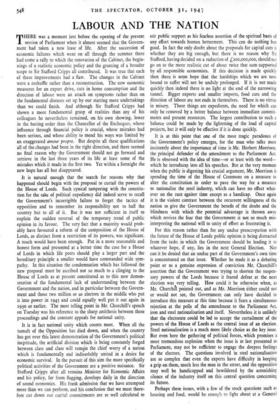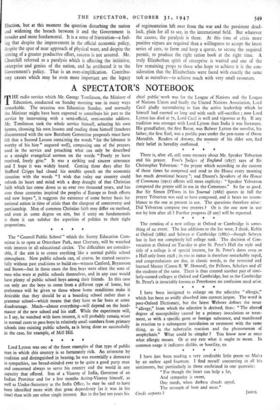LABOUR AND THE NATION
THERE was a moment just before the opening of the present session of Parliament when it almost seemed that the Govern- ment had taken a new lease of life. After the succession of economic failures which went on all through the summer there had come a rally to which the renovation of the Cabinet, the begin- nings of a realistic economic policy and the granting of a broader scope to Sir Stafford Cripps all contributed. It was true that each of these improvements had a flaw. The changes in the Cabinet were a reshuffle rather than a reconstruction. The new economic measures for an export drive, cuts in home consumption and the direction of labour were an attack on symptoms rather than on the fundamental diseases set up by our starting more undertakings than we could finish. And although Sir Stafford Cripps had shown a more fundamental grasp of realities than any of his colleagues he nevertheless remained, on his own showing, lower in the batting order than the Chancellor of the Exchequer, whose influence through financial policy is crucial, whose mistakes had been serious, and whose ability to mend his ways was limited by an exaggerated amour propre. But despite all these qualifications all of the changes had been in the right direction, and there seemed no final reason why the Government should not go forward and retrieve in the last three years of its life at least some of the mistakes which it made in the first two. Yet within a fortnight the new hope has all but disappeared.
It is natural enough that the search for reasons why that happened should begin with the proposal to curtail the powers of the House of Lords. Such cynical tampering with the constitu- tion for the sake of political expediency did indeed serve to recall the Government's incorrigible failure to forget the tactics of opposition and to remember its responsibility not to half the country but to all of it. But it was not sufficient in itself to explain the sudden reversal of the temporary trend of public opinion in its favour. The very fact that a majority would prob- ably have favoured a reform of the composition of the House of Lords, as distinct from a restriction of its powers, was significant. A touch would have been enough. Put in a more reasonable and honest form and presented at a better time the case for a House of Lords in which life peers should play a larger part and the hereditary principle a smaller would have commanded wide sym- pathy. In this situation the condemnation which has followed the new proposal must be ascribed not so much to a clinging to the House of Lords as at present constituted as to this new demon- stration of the fundamental lack of understanding between the Government and the nation, and in particular between the Govern- ment and those two million or so electors in the middle who put it into power in 1945 and could equally well put it out again in 1950 or earlier. The most telling point in Mr. Churchill's speech on Tuesday was his reference to the sharp antithesis between these proceedings and the constant appeals for national unity.
It is in fact national unity which counts most. When all the tumult of the Opposition has died down, and when the country has got over this latest demonstration of the Government's political ineptitude, the artificial division which is being constantly forged between class and class will remain the chief worry of a nation which is fundamentally and indissolubly united in a desire for economic survival. In the pursuit Of this aim the more specifically political activities of the Government are a positive nuisance. Sir Stafford Cripps after all remains Minister for Economic Affairs and his policy, far from flagging, develops daily in the direction of sound economics. His frank admission that we have attempted more than we can perform, and his conclusion that we must there- fore cut down our capital commitments are as well calculated to stir public support as his fearless assertion of the spiritual basis of any effort towards human betterment. This can do nothing but good. In fact the only doubt about the proposals for capital cuts is whether they are big enough, but there is no reason why Sir Stafford, having decided on a reduction of £200,000,000, should not go on to the more realistic cut of about twice that sum supported by all responsible economists. If this decision is made quickly then there is some hope that the hardships which we are now bound to suffer Will not be unduly prolonged. If it is not made quickly then indeed there is no light at the end of the narrowing tunnel. Bigger exports and smaller imports, food cuts and the direction of labour are not ends in themselves. There is no virtue in misery. These things are expedients, the need for which can only be removed by a better balance between immediate commit- ments and present resources. The largest contribution to such a balance could be made by the lightening of the load of capital projects, but it will only be effective if it is done quickly.
It is at this point that one of the most tragic paradoxes of the Government's policy emerges, for the man who talks most insistently about the importance of time is Mr. Herbert Morrison. the principal defender of the amendment to the Parliament Act. He is obsessed with the idea of time—or at least with the word— which he introduce; into all his speeches. But at the very moment when the public is digesting his crucial argument, Mr. Morrison is spending the time of the House of Commons on a measure to alter the constitution in order to pave the way for a measure to nationalise the ,steel industry, which can have no effect what- ever on the race against time except as a handicap. Once again it is the violent contrast between the recurrent willingness of the nation to give the Government the benefit of the doubt and the blindness with which the potential advantage is thrown away which revives the fear that the Government is not so much mis- interpreting the national will to unity of effort as frustrating it.
For this reason rather than for any undue preoccupation with the future of the House of Lords public opinion is being distracted from the tasks in which the Government should be leading it to whatever hope, if any, lies in the next General Election. Nor can it ,be denied that an undue part of the Government's own time is concentrated on that issue. Whether he made it as a debating point or as a genuine expression of conviction Mr. Churchill's assertion that the Government was trying to shorten the suspen- sory powers of the Lords because it feared defeat at the next election was very telling. How could it be otherwise when, as Mr. Churchill pointed out, and as Mr. Morrison either could not or would not see, the Government can only have decided to introduce this measure at this time because it fears a simultaneous rejection at the polls of the amendment to the Parliament Act, iron and steel nationalisation and itself. Nevertheless it is unlikely that the electorate could be led to accept the curtailment of the powers of the House of Lords as the central issue of an election. Steel nationalisation is a much more likely choice as the key issue. But even here the gathering of political forces, which promises a most tremendous explosion when the issue is at last presented to Parliament, may not be sufficient to engage the deepest feelings of the electors. The questions involved in steel nationalisation are so complex that even the experts have difficulty in keeping a grip on them, much less the man in the street, and the opposition may well be handicapped and bewildered by the astonishing silence of the industry itself on this central question concerning its future.
Perhaps these issues, with a few of the stock questions such as housing and food., would be enough to fight about at a General Election, but at this moment the question disturbing the nation and widening the breach between it and the Government is broader and more fundamental. It is a sense of fiustration—a feel- ing that despite die improvement in the official economic policy, despite the spur of near approach of physical want, and despite the stirring of a greater productive effort, success is not assured. Mr. Churchill referred to a paralysis which is affecting the initiative, enterprise and genius of the nation, and he attributed it to the Government's policy. That is an over-simplification. Contribu- tory causes which may be even more important are the legacy of regimentation left over from the war and the persistent dead- lock, plain for all to see, in the international field. But whatever the causes, the paralysis is there. At this time of crisis more positive victims are required than a willingness to accept the latest series of cuts, to form and keep a queue, to secure the required permit, to produce the right ration book at the right time. A truly Elizabethan spirit of enterprise is wanted and one of the few remaining props to those who hope to achieve it is the con- sideration that the Elizabethans were faced with exactly the same task as ourselves—to achieve much with very small resources.



































 Previous page
Previous page